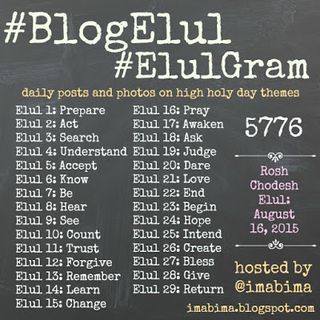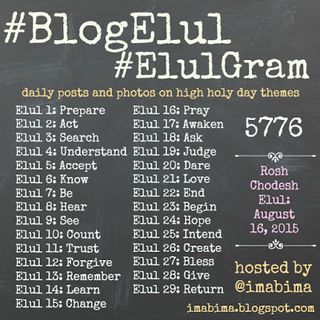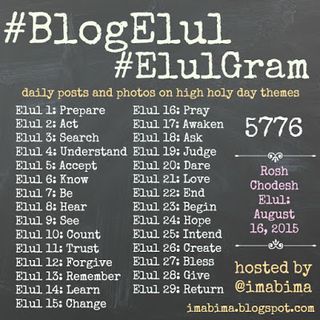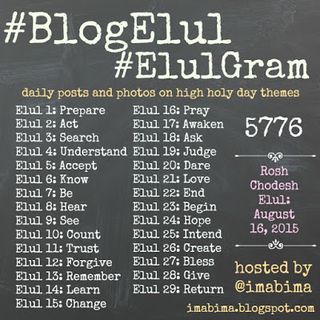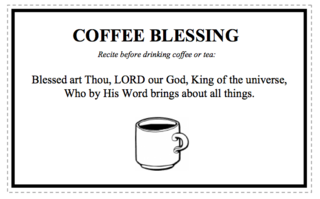Rachel Barenblat's Blog, page 119
August 24, 2015
#blogElul 9: See
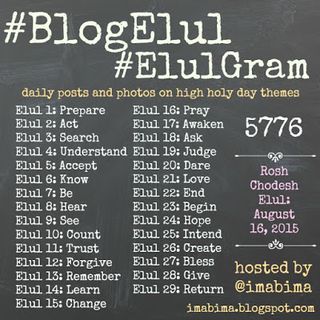
Being seen wholly
is more intimate
than any embrace.
Being known
beyond any pretense,
any veil I wear.
Gift beyond measure:
I don't have to hide
from your loving eyes.
I'm participating again this year in #blogElul, an internet-wide carnival of themed posts aimed at waking the heart and soul before the Days of Awe. (Organized by Ima Bima.) Read #blogElul posts via the Elul tag; last year's posts are now available in print and e-book form as See Me: Elul poems.

August 23, 2015
#blogElul 8: Hear
What's amazing is
that you hear me.
You hear what I say
and what I leave unsaid.
You hear the stirrings
of my most hidden heart.
What's amazing is
no matter what I say
I'll never be
too much for you.
I don't have to fear
driving you away.
Because you hear me
I'm never alone.
I'm participating again this year in #blogElul, an internet-wide carnival of themed posts aimed at waking the heart and soul before the Days of Awe. (Organized by Ima Bima.) Read #blogElul posts via the Elul tag; last year's posts are now available in print and e-book form as See Me: Elul poems.

August 22, 2015
#blogElul 7: Be
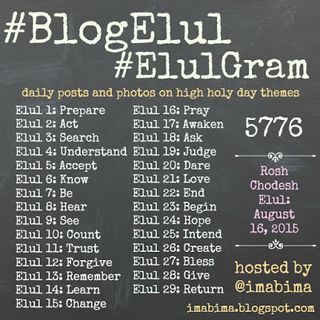
You make me want
to be better.
In your eyes
I become more.
No one else sees me
the way you do.
I see myself
through your eyes
and think: that's not
the me I know me to be.
It's the me I become
when I'm with you.
I want to be
what you see in me.
I'm participating again this year in #blogElul, an internet-wide carnival of themed posts aimed at waking the heart and soul before the Days of Awe. (Organized by Ima Bima.) Read #blogElul posts via the Elul tag; last year's posts are now available in print and e-book form as See Me: Elul poems.

August 21, 2015
#blogElul 6: Know
You know everything
there is to know.
Who I am, and who I was
last time round.
How I carry myself
(eyes forward, head high)
when there's a chasm
gaping in my chest
and how my voice wavers
when I'm overcome with joy.
You know what I yearn for
even the parts I don't admit.
How impossibly lucky
I feel, because
I get to fall asleep
with you in my heart
and begin every day
by greeting you.
You know how much
beyond words means.
I wrote a response to this prompt in prose, but I wasn't satisfied with it. It felt like it was all stuff I'd said before. So I scrapped it, and wrote this poem instead. I think it's part of the same series of love poems to the Beloved which began with Your voice knocks.
I'm participating again this year in #blogElul, an internet-wide carnival of themed posts aimed at waking the heart and soul before the Days of Awe. (Organized by Ima Bima.) Read #blogElul posts via the Elul tag; last year's posts are now available in print and e-book form as See Me: Elul poems.

August 20, 2015
#blogElul 5: Accept
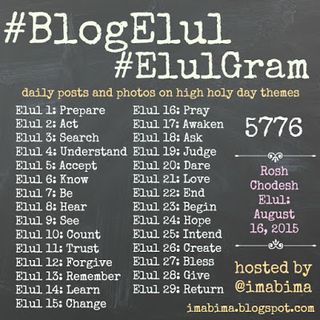 When someone I love is suffering, I don't want to accept it. When someone I love is navigating illness or depression: I don't want to accept it.
When someone I love is suffering, I don't want to accept it. When someone I love is navigating illness or depression: I don't want to accept it.
When someone I love is hurting, I want to do everything I can to mitigate against it. My mind races, asking: what can I do to make this better?
What can I say? What could I put in the mail to them? What little surprise could I arrange to leave by their door? Can't I do something?
I am rereading Rabbi Alan Lew's This Is Real And You Are Completely Unprepared: The Days of Awe as a Journey of Transformation again.
Here is a passage which leapt out at me, from the section of the Elul chapter dedicated to this week's Torah portion, Shoftim:
We know that emotions are contagious. We know that they do not honor the boundaries of self, and even seem to mock them. We all have the same heart. So if someone is afraid, the Torah tells us, we had better send him home from battle before the fear spreads from his heart to ours. The fear is more real than the self.
But this emotional contagion is not limited to fear. Fear is only one example of what ripples soul to soul and heart to heart. Love also does this. So does happiness. So does suffering...
What is occluding the deep connection between you and your fellow human beings? That is also right there over your heart, and that also needs to be looked at. One of the things that most often impedes this connection is our fear of one another's pain.
I love his language of "rippl[ing] soul to soul and heart to heart." Grief does this. Suffering does this. And love does this. He writes, later in that same section, that the problem is not that our loved ones suffer; the problem is our false sense that there's something we're supposed to be able to do about it.
And he tells a story about how, as a hospital chaplain, he would linger outside a patient's door, letting his own fears and anxieties crest: what can I do, I can't fix it, I want to fix it and I can't. And then he would remind himself that his role was not to fix: it was to be present, with acceptance and with love.
When my loved ones are struggling, I find myself in the same boat. I don't want to accept their circumstance; I want to find some way to fix it or improve it. Sometimes I can sweeten it, and I'm glad when that turns out to be true. But ultimately, my job isn't to fix. It's to be present, and to love.
That's what I need to accept. I don't have control over whether and how my loved ones suffer. But I can try to always be present to them with a whole heart and with willingness to let myself be moved.
I'm participating again this year in #blogElul, an internet-wide carnival of themed posts aimed at waking the heart and soul before the Days of Awe. (Organized by Ima Bima.) Read #blogElul posts via the Elul tag; last year's posts are now available in print and e-book form as See Me: Elul poems.

August 19, 2015
#blogElul 4: Understand
Sometimes our high holiday liturgy may be difficult to understand. There are a lot of words. There are extra prayers and poems and hymns. There are allusions to theology -- or more accurately, to theologies, plural, because our understanding of God has shifted and changed over the millennia, and some of our liturgy is very old indeed. As time goes by, I find that I am less interested in helping people understand the liturgy, and more interested in helping them experience it.
Yes, there's merit in understanding our prayers -- whether one is davening them in Hebrew (which for Diaspora Jews is not our first language) or in the vernacular (because even in the vernacular sometimes they're opaque.) But if I have the choice between teaching someone about a prayer, and helping them enter into that prayer, I'll choose the second one. There is a different kind of understanding which can arise not via intellectual inquiry but via experience and heart.
In antiquity the heart was understood to be the center of thought and knowledge. (Today we think of the heart as the seat of emotions, and the brain as the seat of intellect, but that's a relatively new development.) So when our liturgy asks God to open our hearts, the original intention was what we might today call a request for help in opening our minds to enlightenment. But I like the idea that mind and heart are connected. We can seek to understand not only with mind but also with heart.
When you anticipate the Days of Awe coming up in less than a month, where does your mind take you? Are there things -- customs, prayers, texts -- which trip you up, which are difficult to relate to or to understand? What might happen if you let go of the desire for intellectual mastery and instead allowed yourself to relax into experiencing those customs, or prayers, or texts without judgement, without the need to agree or disagree -- what new modes of understanding might arise?
I'm participating again this year in #blogElul, an internet-wide carnival of themed posts aimed at waking the heart and soul before the Days of Awe. (Organized by Ima Bima.) Read #blogElul posts via the Elul tag; last year's posts are now available in print and e-book form as See Me: Elul poems.

August 17, 2015
#blogElul 2: Act
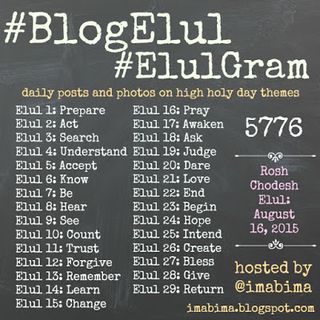 One of the challenges of spiritual life is figuring out how to infuse mundane acts with spirit and heart. Can I train myself to wake in the morning and immediately put down the needle of my mental record player in the groove of gratitude?
One of the challenges of spiritual life is figuring out how to infuse mundane acts with spirit and heart. Can I train myself to wake in the morning and immediately put down the needle of my mental record player in the groove of gratitude?
If I say a blessing, aloud or silently, before eating -- does that change my experience of that act? How about actions like checking email -- can I make that an opportunity for increased spiritual wakefulness, instead of something rote?
There are actions I take which feel sacred, no question about that. Putting on my tallit (and, on weekdays, tefillin) for prayer. Sharing a song, or a cup of coffee, with someone who is dear to me; brightening someone's day with a gesture of love.
And then there are acts which feel disconnected from spiritual life: washing the dishes, putting gas in the car, dealing with the giant to-do lists which proliferate at this season like mushrooms after a rain. Listening to voicemail messages. Taking out the trash. And yet the Hasidic tradition would argue that even those acts, precisely those acts, can be made holy if we do them with awareness.
Getting ready for the Days of Awe isn't something which happens only during the moments when I have the luxury of dedicating myself wholly to meditation or prayer. Preparing for the holidays on a spiritual level goes on all through this month, in every act I undertake -- whether putting money in the tzedakah box, or trying to get our kid dressed and out the door for school, or responding (or not responding!) to an email which has pushed my buttons and brought forth a vehement response.
The question isn't how I act when I know everything is on the line -- at some public function, or leading High Holiday services, or presiding over a funeral for someone I respected and admired. Of course I bring my best self to those occasions. I think God may be more interested in how I act in my every day. How we all act in our every day. For me that's one of the meta-themes of this month: how do I act? Am I putting on an act? Do my actions reflect my truest heart, the person I most want to be?
I'm participating again this year in #blogElul, an internet-wide carnival of themed posts aimed at waking the heart and soul before the Days of Awe. (Organized by Ima Bima.) Read #blogElul posts via the Elul tag; last year's posts are now available in print and e-book form as See Me: Elul poems.

August 16, 2015
I seek your face (for #blogElul 3: Search)
show me your face
in the face in front of me
show me your light
in familiar eyes
show me your heart
in the overflowing of mine
show me how to be hollow
so you can pour through me
show me your name
written in the wheeling stars
show me my name
written across lifetimes
in the face of my beloved
show me your face
Many years ago I heard Rabbi Jeff Roth offer the teaching that the mind is like tofu: it takes on the flavor of whatever one marinates it in. During the four weeks of Elul, I'm marianting in two melodic settings of parts of Psalm 27.
One is the Kirtan Rabbi's set of chants which use verses from that psalm, tracks 2-4 on his CD Achat Sha'alti (One Thing I Ask.) And the other is Nava Tehila's setting of verse 8, Lach Amar Libi:
High Holidays Chants מנגינות לימים הנוראים by Nava Tehila
This poem arose out of these two excerpts from the psalm. "One thing I ask of You --" and "You called to my heart, 'seek My face' -- Your face, Source of All, is what I seek!"
I'm participating again this year in #blogElul, an internet-wide carnival of themed posts aimed at waking the heart and soul before the Days of Awe. (Organized by Ima Bima.) Read #blogElul posts via the Elul tag; last year's posts are now available in print and e-book form as See Me: Elul poems.

On meteors, the night sky, and seeing ourselves in a new light - thoughts for Elul
A few nights ago a friend reminded us that the Perseid meteors were going to be visible. So around 9pm we turned off all of our lights and went outside and lay on our backs on the deck and stared up at the sky. I knew it would take a while for my eyes to adjust.
From the moment I looked up at the heavens I was awestruck by the sheer number of stars. And I thought to myself: even if I don't see any meteors, dayenu, it's enough, because this is so beautiful. And then I saw one streak across the sky, and it was amazing.
I know that we are blessed to live in a place that doesn't have a lot of "light pollution" -- where we can turn off our lights and really see the night sky. And I know that the reason the stars were so visible is that there was almost no moon.
Because this weekend is Rosh Chodesh -- new moon. Now the moon starts growing again. This is one of the things I love about being attuned to the Jewish calendar: it means I'm also always attuned to the phases of the moon as she waxes and wanes.
The moon will grow for two weeks, and shrink for two weeks, and the next new moon is Rosh Chodesh Tishrei, also known as Rosh Hashanah.
Rosh Hashanah is four weeks from this Sunday. Maybe for some of you that doesn't sound like a big deal. So what? You're not writing sermons or preparing services, so does it really make a difference to you? I want to say today that it can make a difference -- and I hope that it will.
Our tradition teaches that this is a month during which we should deepen our spiritual practices, whatever they may be. This is a month for spiritual preparation, a month during which we look back on the year now ending. Who have you been, since last Rosh Hashanah?
What are you proud of, and what do you feel ashamed of? When were you the best self you know how to be, and when did you fall short? How's your relationship with God these days -- whatever that word or idea means to you?
If we spend these next four weeks in introspection, discerning where we may have mis-stepped and where we forged a wise path, then when we get to Rosh Hashanah we'll experience those two days of prayer and song and story in a different way.
If we spend these next four weeks rekindling our spiritual practices -- be they yoga, or meditation, or prayer, or walking in the woods -- then when we metaphorically call up God on Rosh Hashanah we won't need to be afraid of hearing, "it's been a whole year -- nu, you don't write, you don't call...!"
One Hasidic teaching holds that Elul is the time when "the King is in the fields" -- when God leaves the divine palace on high and enters creation to walk with us in the meadows and listen to the deepest yearnings of our hearts. God is extra-available to us this month. What do we most need to say?
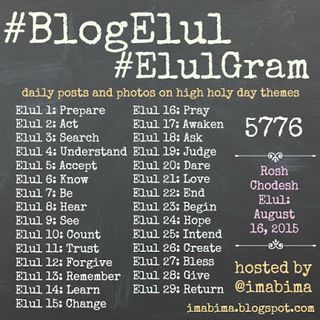 Another Hasidic teaching points out that the name of this month, Elul, can be read as an acronym for אני לדודי ודודי לי / Ani l'dodi v'dodi li -- "I am my Beloved's, and my Beloved is mine." The Beloved, in this context, is God. We belong to God, and God belongs to us, and what connects us is love.
Another Hasidic teaching points out that the name of this month, Elul, can be read as an acronym for אני לדודי ודודי לי / Ani l'dodi v'dodi li -- "I am my Beloved's, and my Beloved is mine." The Beloved, in this context, is God. We belong to God, and God belongs to us, and what connects us is love.
The stars are there every night, but we can only see them when there are no clouds and when the moon has dwindled. The opportunity to do the work of teshuvah, repentance / return, is there all year long -- but some seasons of the year offer us special opportunities to see ourselves in a new light.
This is a time of month when the night sky is filled with tiny lights. And this is a time of year when we can open our hearts and souls to the light of God's presence as we do the work of discernment and transformation. Imagine what we might see in ourselves if we take the time to let our eyes adjust.
Here's to a meaningful Elul.
This is the d'var Torah (really more of a word about the season) which I offered at my shul yesterday. It's also my offering for the first day of #blogElul. I'm not committing to posting something daily for #blogElul this year, but here's an offering for day 1.

August 12, 2015
Making my morning coffee holy
 Sometimes in the morning I find myself singing the words אין מספיק כפה בעולם / ein maspik cafe ba'olam -- "there's not enough coffee in the world" -- to the Rizhyner's melody for Ana B'Koach. (That's the first mp3 of the several on this NeoHasid page.)
Sometimes in the morning I find myself singing the words אין מספיק כפה בעולם / ein maspik cafe ba'olam -- "there's not enough coffee in the world" -- to the Rizhyner's melody for Ana B'Koach. (That's the first mp3 of the several on this NeoHasid page.)
And then I acquire a cup of joe, and I change my tune. Instead of bemoaning what I don't have, I celebrate what I do. The blessing I say over my morning coffee is a line from our daily liturgy, and the practice of using it in this way is one I learned from my friend Rabbi Megan Doherty.
In the daily amidah, the prayer which is recited standing and which is central to every Jewish service, there is a blessing which ends with the line ברוך אתה ה' מחייה המתים / baruch atah Adonai m'chayyeh ha-meitim –– "Blessed are You, Adonai, Who enlivens the dead." In modern times, some prayerbooks have amended the final word from מתים to הכל, so that it now reads "Blessed are You, Adonai, Who enlivens all things." Others amend the translation to "...Who enlivens the deadened."
Jewish teachings about resurrection, and how those ideas have shifted and changed over the last few thousand years or so, could make up their own very long post. For now, just take it as read that this phrase is part of our standard daily liturgy, and that these days it's understood in a variety of different ways. (If you're interested in learning more about Jewish ideas on death and resurrection, there's a decent overview at My Jewish Learning: Jewish Resurrection of the Dead.)
With the shifted translation -- making the bracha not about literal resurrection, per se, but about God Who brings life to that which had been deadened -- I've used this blessing sometimes over antidepressants. (See my poem Change, which appears in my second collection Waiting to Unfold.) In general I like the broader translation, and as a poet I think it's an entirely fair way to render המתים / hameitim. Anyway, these days I make this blessing over my first cup of morning caffeine.
Here's the blessing most people offer.
The traditional blessing over coffee would be שהכל נהיה בדברו / shehakol nihiyeh bidvaro – "...Who creates all things with Your word." That's the standard blessing which we recite over any food or drink which doesn't have its own blessing -- it's the catch-all for everything else. I like that blessing too. But I like doing coffee differently. It's a sweet little moment of ritual. It helps me sanctify one of the day's most mundane acts. And it reminds me to be thankful for being alive and being enlivened, every day.
Related: Morning blessings with Drew, 2013. Also, if you like the idea of prayers relating to coffee or tea, you might enjoy this pair of Caffeine (tea and coffee) Litanies I saw on Twitter recently.

Rachel Barenblat's Blog
- Rachel Barenblat's profile
- 6 followers


